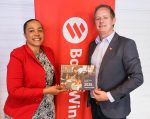September 2024 vehicle sales reached 988 units, marking a continued decline in the units sold for the past two months, a report by Simonis Storm reveals.
Out of the 988 units sold inSeptember2024,978 were sold to dealerships, 10 to rental agencies and none to government. Vehicle purchases by rental agencies have significantly declined over the past two months, with sales dropping from141 units in July 2024 to just 10 units in September 2024.
“The overall vehicle market was largely supported by sales in the commercial vehicle segment,” said Simonis Storm.
While the third quarter of 2015 holds the record for the highest vehicle sales (5200), the third quarter of 2024, saw a total of 3155 units sold, representing an 7.5% decrease compared to the same period last year which recorded 3411 units sold.
In September 2024, a total of 553 commercial vehicles were sold, comprising 56%of total vehicle sales, marking two consecutive months of decreasing units sold. The sales in the commercial category can primarily be attributed to light commercial vehicles, which made up a remarkable 48.8% of total vehicles sold for September 2024.
“However, the picture varies across different categories of commercial vehicles. Medium commercial vehicles saw a decline, with only 21 units sold, representing a contraction of 23.5%y/y. On the other hand, heavy commercial vehicles experienced positive growth of 23% y/y, with 16 new units sold. Extra heavy commercial vehicles, in contrast, contracted by 12.5%y/y, while buses witnessed a significant increase of 450% with 11units sold in September 2024,” said Simonis Storm.
Passenger vehicles, constituting 44% of total vehicle sales, experienced a decrease in September 2024, with 435 new units sold, marking the second consecutive month of decline. This reduction in passenger vehicle sales could reflect consumers’ hesitancy due to prevailing future interest rate decisions.
“Despite the economic challenges, the continued sales activity may still indicate underlying consumer confidence and suggest potential for sustained momentum in the vehicle market as broader economic conditions stabilize or improve.”
Within the light commercial vehicle segment, the Toyota Hilux maintained its position as the most popular choice with 255 units sold. In the medium commercial vehicle category, the Mercedes Benz Sprinter was the leader with 7 units sold, while the Hino 500 series led in heavy commercial vehicles. Extra heavy commercial vehicles were dominated by the Volo FH, and the Mercedes Benz Bus emerged as the preferred option among buses. For passenger vehicles, the Toyota Fortuner (60) remained a top choice among consumers. With the Toyota Corolla Cross (54) and Polo Vivo (48) trailing behind.
Despite hopes for a recovery in the final quarter, South Africa’s new-vehicle market remained in decline in September 2024, with sales dropping by 4.1% year-on-year to 44,081 units. However, on a month-on-month basis, the market showed a modest 1.1% improvement over August 2024. Year-to-date figures reflect the ongoing economic challenges, with new vehicle sales in South Africa reaching 401,169 units by the end of September 2024, marking a 5.8% decline compared to the same period in 2023. Export performance has been particularly weak, plummeting by 38.1% year-on-year in September to just 21,964 units, the second-lowest monthly total of the year. For the year to date, exports have fallen to 289,198 units, a sharp 19.7% decrease compared to the first nine months of 2023.
Similarly, domestic sales have struggled, with the current year-to-date total of 401,169 units, down by 5.8%. Naamsa reported that in September 2024, 79% of industry sales were registered through the dealer channel, 15% were attributed to the vehicle-rental industry, while government and corporate fleets accounted for 3% and 2%, respectively. Interestingly, bucking the broader market trend, the new passenger-vehicle segment grew by 2% year-on-year, with 30,218 units sold in September 2024. The rental industry played a significant role in this growth, contributing 28% of total passenger vehicle sales. On the other hand, the light-commercial vehicle segment experienced a sharp decline, with registrations down 17.1% year-on-year to 10,914 units.
“Economic indicators in September 2024 showed positive trends, including a month of lower interest rate since May 2023, a stronger Rand/Namibian Dollar, and easing inflation below the 4% mark. Lower fuel prices further bolstered consumer and business confidence, offering relief to household budgets. Although the July 2024 increases did not continue in August, the Commercial Vehicles segment has shown a positive trend in recent months, boosted by the mentioned macro factors.
“As the country anticipates further interest rate reductions, the costs of borrowing are expected to decline, which may stimulate economic activity, even though immediate improvements in vehicle affordability may be limited. Since the decline in new vehicle sales began in April 2024, expectations are rising that the new vehicle market could see improvement for the remainder of the year due to favourable economic conditions,” said Simonis Storm.










